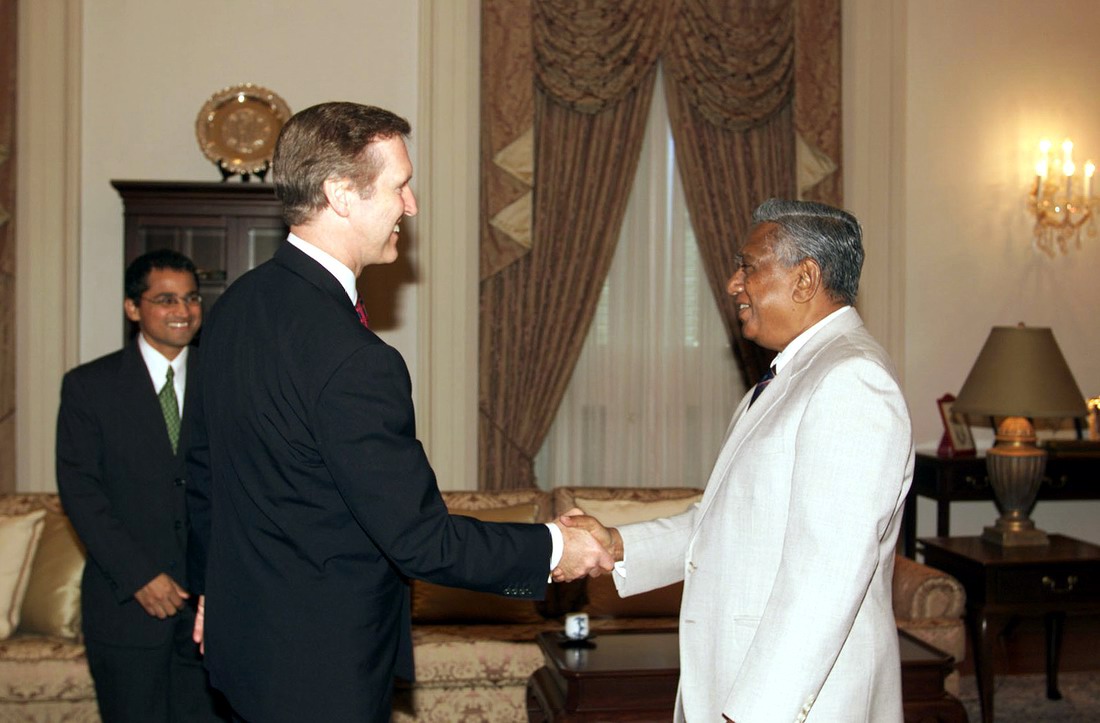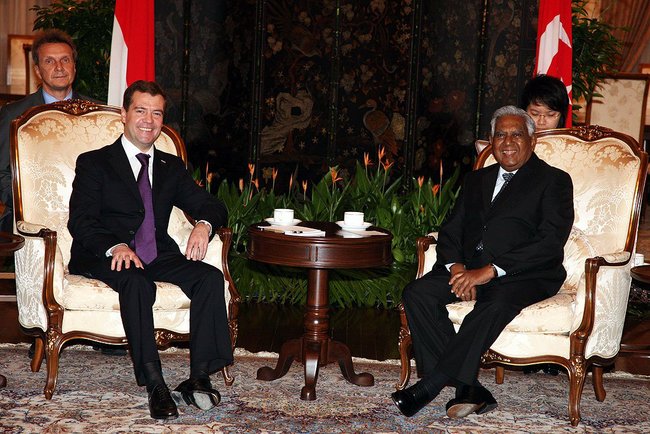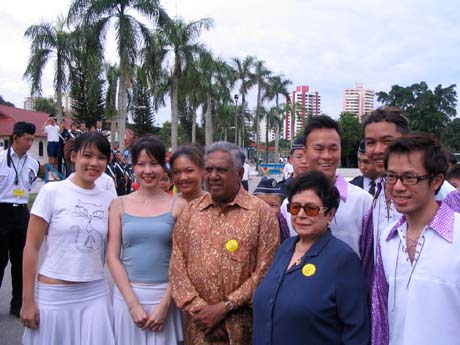1. Early Life and Education
Sellapan Ramanathan, of Tamil Indian descent, was born in Singapore on 3 July 1924. He spent his early childhood in Muar, Johor, with his parents, V. Sellapan and Abirami, and two older brothers, in a house that overlooked the sea. Although he was eventually one of seven siblings, his three older brothers died in childhood. His father, a lawyer's clerk for a firm servicing rubber plantations in the Malayan town, faced severe financial hardship due to the Great Depression and the rubber slump of the 1930s. Accruing significant debts, Nathan's father tragically committed suicide when Nathan was only eight years old.
Returning to Singapore, Nathan received his primary education at Anglo-Chinese Primary School and Rangoon Road Morning School, and his secondary education at Victoria School. However, his early schooling was tumultuous; he was expelled from school twice and, following a quarrel with his mother, ran away from home at the age of 16. During the Japanese occupation of Singapore, Nathan learned Japanese and worked as a translator for the Japanese civilian police, specifically within the Kempeitai's Keimubu branch. After the war, while working, he persevered to complete his secondary education through a correspondence course with Wolsey Hall, Oxford. He then gained admission to the University of Malaya (which was then located in Singapore), where he became the secretary of the University Socialist Club during his second year. He graduated in 1954 with a Diploma in Social Studies (Distinction).
2. Civil Service Career
S. R. Nathan dedicated a significant portion of his life to the Singapore Civil Service, where he held a variety of crucial roles that shaped his commitment to public administration and nation-building. His career spanned several key ministries and departments, showcasing his versatility and unwavering dedication to the nation's development and security.
2.1. Early Public Service and Labour Movement
Nathan began his career in the Singapore Civil Service in 1955 as a medical social worker. The following year, he was appointed as a Seamen's Welfare Officer, a role that saw him working in the historic Fullerton Building, which then housed the Marine Department. In recognition of this early service, his funeral cortège later passed by the building.
In 1962, Nathan was seconded to the Labour Research Unit of the National Trades Union Congress (NTUC), initially serving as an assistant director before being promoted to director, a position he held until January 1966. During this period, he played a pivotal role in negotiating Singapore's membership of the Afro-Asian People's Solidarity Organisation, demonstrating his early engagement in international relations through the labour movement. His commitment to workers' rights continued, and he later served as a member of the NTUC's Board of Trustees from 1983 to April 1988, advocating for the welfare of the working class.

2.2. Ministry of Defence and Intelligence
In February 1966, Nathan was transferred to the Ministry of Foreign Affairs, where he rose from Assistant Secretary to Deputy Secretary. In January 1971, he was appointed Deputy Secretary of the Ministry of Home Affairs. On 6 August of the same year, Nathan moved to the Ministry of Defence, taking on the critical role of Director of the Security and Intelligence Division (SID).
His tenure in intelligence was marked by an act of extraordinary courage during the Laju incident on 31 January 1974. In this terrorist attack, members of the Japanese Red Army and the Popular Front for the Liberation of Palestine bombed petroleum tanks on Pulau Bukom off the coast of Singapore. Nathan was among a group of government officers who bravely volunteered to be held hostage by the Japanese Red Army. They accompanied the terrorists on a flight to Kuwait to secure the release of civilian hostages and ensure the terrorists' safe passage. For his exceptional bravery and dedication, Nathan was awarded the Pingat Jasa Gemilang (Meritorious Service Medal) in August 1974.
2.3. Ministry of Foreign Affairs and Diplomacy
In February 1979, Nathan returned to the Ministry of Foreign Affairs, where he served as its First Permanent Secretary until February 1982. After a period in the private sector, he re-entered public service in the diplomatic field. In April 1988, he was appointed Singapore's High Commissioner to Malaysia. Following this, in July 1990, he became Ambassador to the United States, serving in this crucial diplomatic role until June 1996.
Upon his return to Singapore, Nathan was made an Ambassador-at-Large and concurrently served as the Director of the Institute of Defence and Strategic Studies at the Nanyang Technological University. He resigned from his ambassadorial and directorial positions on 17 August 1999 to stand as an independent candidate in the 1999 Singaporean presidential election.
3. Business and Other Public Service Roles
After concluding his tenure as First Permanent Secretary of the Ministry of Foreign Affairs in February 1982, S. R. Nathan transitioned to the private sector, taking on the executive chairmanship of the prominent newspaper company, the Straits Times Press. This appointment initially drew criticism from journalists who perceived it as a government attempt to curtail freedom of the press, leading them to wear black armbands in protest. However, Nathan later recounted in a 2010 interview that the journalists' confidence grew "when they saw I was not doing what they expected me to do."
Between 1982 and 1988, Nathan also held directorships in several other companies, including the Singapore Mint, The Straits Times Press (London), Singapore Press Holdings, and Marshall Cavendish. From September 1996 to August 1999, he served as a director of Singapore International Media. Earlier in his career, from 1973 to 1986, he was the Chairman of Mitsubishi Heavy Industries Singapore, a ship-repairing and engineering joint venture with the Mitsubishi Group of Japan.
Beyond his corporate roles, Nathan maintained an active commitment to civic society and community organizations. From 1983 to April 1988, he chaired the Hindu Endowments Board. He was also a founding member of the Singapore Indian Development Association (SINDA) and served as its term trustee until August 1999, contributing to the upliftment of the Indian community in Singapore. Demonstrating his dedication to inter-religious harmony, he became the first patron of the Inter-Religious Organisation from 2012 until his passing in 2016.
4. Presidency (1999-2011)
S. R. Nathan's presidency marked a significant chapter in Singapore's history, characterized by his dedication to national service and efforts to strengthen social cohesion. He became Singapore's longest-serving Head of State, leaving an indelible mark through his initiatives and responsible exercise of presidential powers.
4.1. Election and Terms
In the 1999 Singaporean presidential election, S. R. Nathan was elected unopposed as president on 18 August 1999, after two other prospective candidates were deemed constitutionally ineligible. His candidacy received support from prominent figures such as Senior Minister Lee Kuan Yew and former President Wee Kim Wee. He officially succeeded Ong Teng Cheong as the President of Singapore and was sworn into office on 1 September 1999. Upon assuming the presidency, he was also appointed ex officio Chancellor of the National University of Singapore (NUS) and the Nanyang Technological University (NTU).
For the 2005 Singaporean presidential election, the Presidential Elections Committee (PEC) declared Nathan as the only eligible candidate on 13 August, rejecting three other applications based on constitutional criteria. Consequently, he was elected unopposed for a second term on 17 August 2005 and was sworn in on 1 September 2005. As of 2016, Nathan remains the only person to have served two full terms as president. His extended service made him Singapore's longest-serving President, surpassing his predecessor Benjamin Sheares in January 2010, and then Yusof Ishak as Singapore's longest-serving Head of State in August of the same year.
| Election | Outcome |
|---|---|
| 1999 Presidential Election | Elected unopposed |
| 2005 Presidential Election | Elected unopposed |
4.2. Presidential Initiatives and Powers
During his presidency, Nathan launched several key initiatives and exercised significant constitutional powers to safeguard national interests and promote social welfare.
In 2000, he initiated the annual President's Challenge, a charity fundraising drive aimed at supporting vulnerable groups and fostering community spirit. This initiative continued under his successor, President Tony Tan, and by 2016, the movement had successfully raised approximately 160.00 M SGD, demonstrating its significant impact on social equity.

A notable instance of his responsible exercise of presidential powers occurred on 21 January 2009. Nathan approved in principle the government's request to draw 4.90 B USD from the nation's past financial reserves. This unprecedented move was to fund the Government's Resilience Package, comprising two schemes designed to preserve jobs and businesses during the Great Recession: the Jobs Credit scheme, which provided financial assistance to employers for employee salaries, and the Special Risk-Sharing Initiative, which helped mid-sized companies secure credit. This marked the first time the President's discretionary powers were utilized for such a purpose, highlighting his focus on economic stability and social protection during a crisis. His formal approval of the drawdown was subsequently signified in two notifications dated 13 March 2009.

Nathan also engaged actively in international diplomacy. In 2009, he made a state visit to Japan, marking the first time a Singaporean President visited the country as a state guest. During this visit, he was received by Emperor Akihito and Empress Michiko, and held meetings with the Speakers of both houses of the Japanese Parliament and then-Prime Minister Tarō Asō. Notably, he was also the first foreign head of state to meet with Hiroshima A-bomb victims, underscoring his commitment to human rights and peace. His international engagements continued with state visits to Bahrain in November 2010 and Mauritius in June 2011. Throughout his presidency, Nathan also served as a patron for various educational institutions, including the Singapore Management University (from 2000 to 2011) and the Singapore University of Social Sciences (from 2006 to 2011).
5. Post-Presidency
On 1 July 2011, S. R. Nathan announced his decision not to seek a third term as president, citing his age as a primary factor. At 87, he felt he could no longer indefinitely undertake the heavy responsibilities and physical demands associated with the position of Head of State. He officially left office on 1 September that same year and was succeeded by Tony Tan.
Following his retirement from the presidency, Nathan continued to contribute to public discourse and education. On 19 September 2011, just weeks after leaving office, his memoir, An Unexpected Journey: Path to the Presidency, was officially launched by Prime Minister Lee Hsien Loong. Concurrent with the book launch, the S. R. Nathan Educational Upliftment Fund was inaugurated. This fund was established to provide bursaries, scholarships, and other forms of financial assistance to needy students at the Institute of Technical Education, polytechnics, and universities, reflecting his enduring commitment to social mobility and support for the less privileged.

Nathan also took on distinguished academic roles. Having served as the patron of the Singapore Management University (SMU) during his presidency (2000-2011), he became a Distinguished Senior Fellow at the SMU School of Social Sciences after completing his term. He held a similar position at the Institute of Southeast Asian Studies. Additionally, from 2012 until his death in 2016, he served as the first patron of the Inter-Religious Organisation, further demonstrating his dedication to fostering multiracialism and inter-religious harmony in Singapore.
6. Personal Life
S. R. Nathan was married to Urmila Nandey, born in 1929, on 15 December 1958. Their marriage brought them one son, Osith, and one daughter, Juthika. He was also a grandfather to three grandchildren and had a sister named Sundari. Nathan was a follower of the Hindu faith. He was also a member of the Freemasons.
7. Illness and Death
On the morning of 31 July 2016, S. R. Nathan suffered a stroke and was admitted to the Intensive Care Unit of Singapore General Hospital. He remained in a coma for three weeks following the stroke. Nathan passed away peacefully in the hospital on 22 August 2016, at 9:48 pm SST, at the age of 92. He was survived by his wife, Urmila Nandey (known as Umi), his daughter Juthika, his son Osith, three grandchildren, and his sister Sundari.

As a mark of profound respect for his extensive service to the nation, the Government directed that the National Flag be flown at half-mast from all government buildings from 23 to 26 August. Nathan's body lay in state at Parliament House on 25 August, allowing members of the public to pay their last respects.
On 26 August, a state funeral was held to honor Nathan. His body was conveyed by a ceremonial 25-pounder gun carriage from Parliament House to the University Cultural Centre of the National University of Singapore (NUS). The state funeral procession was carefully planned to pass by several landmarks significant to his life and career, including City Hall, where he had attended three National Day Parades; The Fullerton Hotel Singapore, formerly the Fullerton Building, which had housed the Marine Department where he worked as a Seamen's Welfare Officer; and NTUC Centre, recalling his formative years in the labour movement.
Eulogies at the state funeral were delivered by prominent figures, including Prime Minister Lee Hsien Loong and Ambassadors-at-Large Tommy Koh and Gopinath Pillai, who paid tribute to his "abiding sense of duty" and exceptional service. The music played during the ceremony included "Thanjavooru Mannu Eduthu" ("Taking the Sands of Thanjavur") from the Tamil film Porkkaalam (Golden Age, 1997). This was Nathan's favorite song, as he viewed its narrative-about a dollmaker who molds a beautiful lady from sand, clay, and water from different lands, eventually giving her life-as a powerful metaphor for Singapore's rich multiracial heritage. Following the state funeral, a private cremation was held at Mandai Crematorium. Japanese Prime Minister Shinzo Abe, accompanied by his wife Akie and Foreign Minister Fumio Kishida, visited the Singapore Parliament to pay their respects, highlighting Nathan's international standing.
8. Legacy and Honours
S. R. Nathan's enduring contributions to Singapore are recognized through various institutions renamed in his honour and an extensive list of national and international awards, medals, and honorary degrees, reflecting his lifelong dedication to public service and social progress.
In 2018, the School of Human Development and Social Services at the Singapore University of Social Sciences (SUSS) was renamed the S R Nathan School of Human Development (NSHD). This renaming was a tribute to his advocacy for social and community causes, particularly during his time as a patron of SUSS.
8.1. National Honours
Nathan received numerous national accolades for his distinguished service to Singapore:
- Bintang Bakti Masyarakat (Public Service Star) - 1964
- Pingat Pentadbiran Awam (Perak) (Public Administration Medal, Silver) - 1967
- Pingat Jasa Gemilang (Meritorious Service Medal) - 1974 (awarded for his exceptional bravery during the Laju incident)
- First Class of the Order of Temasek (DUT) - 2013
8.2. Honorary Degrees and Awards
Nathan was widely recognized by academic institutions for his contributions to education and society:
- The National University of Singapore (NUS), where he served as Chancellor from 1999 to 2011 during his presidency, conferred upon him an Eminent Alumni award in 2007, followed by an honorary Doctor of Letters (D.Litt.) on 5 July 2012.
- The Singapore Management University (SMU) also honored him with an honorary D.Litt. on 14 July 2014.
- In 2015, the Faculty of Arts and Social Sciences of NUS presented him with its Distinguished Arts and Social Sciences Alumni Award for lifetime achievement.
- During a state visit to Mauritius in June 2011, the University of Mauritius conferred upon him an honorary Doctor of Civil Law (D.C.L.) degree, acknowledging his significant contributions to education and culture.
8.3. Other Recognitions
Beyond academic and national honors, Nathan's leadership extended to other significant organizations:
- He served as the Chief Scout of the Singapore Scout Association during his presidency. In recognition of his service to the scouting movement, he received the Asia-Pacific Regional Distinguished Scout Award in 2005 and the Association's Distinguished Service Award (Gold) in 2010.
8.4. Foreign Honours
Nathan's achievements and diplomatic efforts were also recognized internationally:
- From Bahrain: In November 2010, during a state visit to Bahrain, he was bestowed with the Al-Khalifa Order.
- From the United Kingdom: In 2006, he was appointed an Honorary Knight Grand Cross of the Order of the Bath (GCB).
- From India: In 2012, the Government of India conferred the Pravasi Bharatiya Samman (Overseas Indian Award) upon Nathan, acknowledging his instrumental role in fostering closer ties between Singapore and India.
9. Publications
S. R. Nathan authored several notable works, offering insights into his experiences, foreign policy perspectives, and personal reflections on his distinguished career in public service. His published books include:
- Singapore's Foreign Policy: Beginnings and Future (2008)
- Why Am I Here?: Overcoming Hardships of Local Seafarers (2010)
- An Unexpected Journey: Path to the Presidency (2011)
- Winning against the Odds: The Labour Research Unit in NTUC's Founding (2011)
- The Crane and the Crab (2013)
- S. R. Nathan: 50 Stories from My Life (2013)
- S. R. Nathan in Conversation with Timothy Auger (2015)